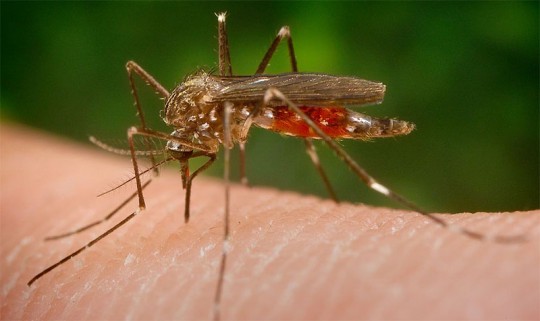New ‘Aggressive’ Mosquito Species Found In North Escambia
June 7, 2018
The Escambia County Mosquito Control Division has identified a new species of mosquito within the county called Aedes japonicus, or Asian bush mosquito. Mosquito Control Technician Kimberly Betts identified the new species from a CDC light trap set in Cantonment near International Paper.
The Asian bush mosquito can also be found in Santa Rosa, Walton, Okaloosa, Bay and Leon Counties, and with the migration into Escambia, it brings the known list of mosquito species in Escambia County to 73.
Mosquito Control Technician Kimberly Betts realized the mosquito was not an Asian tiger mosquito, one of the local prominent container breeding mosquitoes, because the markings and colors were different. Two samples of the newly found mosquito were sent to a lab in Vero Beach, Florida and were officially verified as a new species within the county.
The Asian tiger and Asian bush mosquitoes both breed in natural and artificial water containers, including rock pools, bird baths, pet bowls and flower containers. Like the Asian tiger mosquito, the Asian bush mosquito is an aggressive daytime-biting mosquito, capable of transmitting several diseases to animals and people, according to Escambia County.
To help reduce the risk of getting bitten by mosquitoes, Escambia County said residents should follow the “Five D’s and an S” of mosquito control:
- Dusk to Dawn – is the time frame when mosquitoes are most active. Reduce or eliminate outdoor activity between dusk and dawn or take precautions to prevent mosquito bites
- Drainage – is key to eliminating breeding sites for mosquitoes. Check around your home to rid the area of standing water. Water found in old tires, flowerpots, clogged rain gutters, leaky pipes and faucets, birdbaths and wading pools is where mosquitoes can lay their eggs.
- Dress – in light colored, long sleeves and pants when you are outside, especially in mosquito infested areas.
- DEET – if you are going to be outside when mosquitoes are most active, make sure you apply insect repellent that contains DEET (N,N-diethyl-m-toluamide). Read and follow label instructions. Spray both exposed skin and clothing with repellent when outdoors.
- Screens – make sure window and door screens are in good condition.
Animals, such as dogs, cats and horses may be bitten by mosquitoes as well, though these animals may be protected by using vaccines and other methods as prescribed. Consult your veterinarian for methods to protect animals from mosquito-borne diseases.
To request Escambia County Mosquito Control Services including being added to the “no spray/fog” list, contact the Mosquito Control Division at 850-937-2188, mosquitocontrol@myescambia.com, submit an online request here.
Pictured: The Aedes japonicus mosquito. Photo for NorthEscambia.com, click to enlarge.
Comments
7 Responses to “New ‘Aggressive’ Mosquito Species Found In North Escambia”




Don’t forget that leafy and debris filled gutters hold enough moisture to create a veritable mosquito ranch, not to mention becoming a haven for roaches, carpenter ants, silverfish, etc.
Need more skeeter hawks.
(AKA dragonflies)
I just wish Mosquito Control would run a spray truck in Century. I can’t remember the last time I have seen one up here. The mosquitos, yellow flies, biting house flies, horse flies and the nat’s are terrible. If they suck blood then they can carry diseases. Just saying
I have a bat house but no bat has ever set up shop. We could breed bats and release them just for this purpose. What about lots of frogs?
With so little rain this year, I haven’t seen the city trucks spraying for mosquitoes yet this year.
Just because a mosquito species is capable of spreading a disease if first has to be positive with that disease before it can spread any disease There are many species in Escambia County capable of spreading multiple diseases but luckily there no positive mosquito species carrying a disease known at this time.
I think I’m going to make some bat houses. I read that a single bat can eat up to a thousand mosquitoes in one hour.